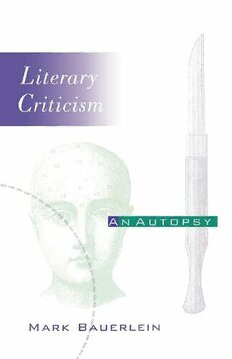
Literary Criticism: An Autopsy PDF
Preview Literary Criticism: An Autopsy
Literary Criticism: An Autopsy CRITICAL AUTHORS & ISSUES Josue Harari, Series Editor A complete list of books in the series is available from the publisher. Literary Criticism: An Autopsy Mark Bauerlein PENN University of Pennsylvania Press Philadelphia Copyright© 1997 University of Pennsylvania Press All rights reserved Printed in the United States of America on acid-free paper 10 9 8 7 6 5 4 3 2 Published by University of Pennsylvania Press Philadelphia, Pennsylvania 19104-6097 Library of Congress Cataloging-in-Publication Data Bauerlein, Mark. Literary criticism, an autopsy I Mark Bauerlein. p. em. ISBN: 978-0-8122-1625-7 1. Criticism. I. Title. PN81.B387 1997 801'.95-dc21 97-14199 CIP to Eve-Alice Roustang This page intentionally left blank Contents Preface IX Introduction 1 A Critical Glossary 17 construction 17 cultural poetics 23 cultural studies 30 decisive assertions 35 deconstruction 42 discipline 48 discourse 51 essentialize 57 gender 62 ideology 69 -ing 74 interdisciplinary 78 literary criticism 81 the logic of 92 political criticism 103 problematize 109 the question of 113 radical ll8 rethink 122 sociology ofliterature 125 theory 131 voice 132 what so-and-so calls 136 viii Contents Epilogue 141 Bibliography 149 Index 155 Preface In 1994, at an English department meeting at Emory University, I found myself in the middle of a debate over future staffing needs. Naturally, the faculty members all had varying, though mutually re spectful opinions. Some thought we should fill historical gaps in our curriculum with entry-level period specialists. Others pushed for a distinguished scholar in any field to strengthen the research credentials of the graduate program. Another opted for a compo sition specialist to waylay the adjunct hiring we have to undergo every semester. Yet another suggested a computer expert to bring us all technologically up to date. Though we disagreed abuut the relative merits of each proposal, we admitted each one as having some measure of justification. Everyone recognized a rationale behind each idea being thrown around the table and understood that the department's final choice was a matter of deciding on the priority of one proposal over an other, not accepting one and rejecting the others. We merely had to rank them in terms of urgency. But, as the colloquy proceeded, one colleague offered a general comment that introduced a new concern. He said, "I think we should all realize that the world has changed drastically in the last twenty years and that we should think about how we as a department and as individual scholars and teach ers are going to represent those changes." A lull followed this state ment, as if the other faculty members were thinking about how to assimilate Professor X's wake-up call to the issue at hand. Maybe X intended his point as a reproof to some of the conservative opinions expressed ("We need a straightforward Miltonist"). Perhaps it was meant as support for arguments for a less traditionally defined scholar, a postcolonialist or a cultural critic, for example. Or per-
